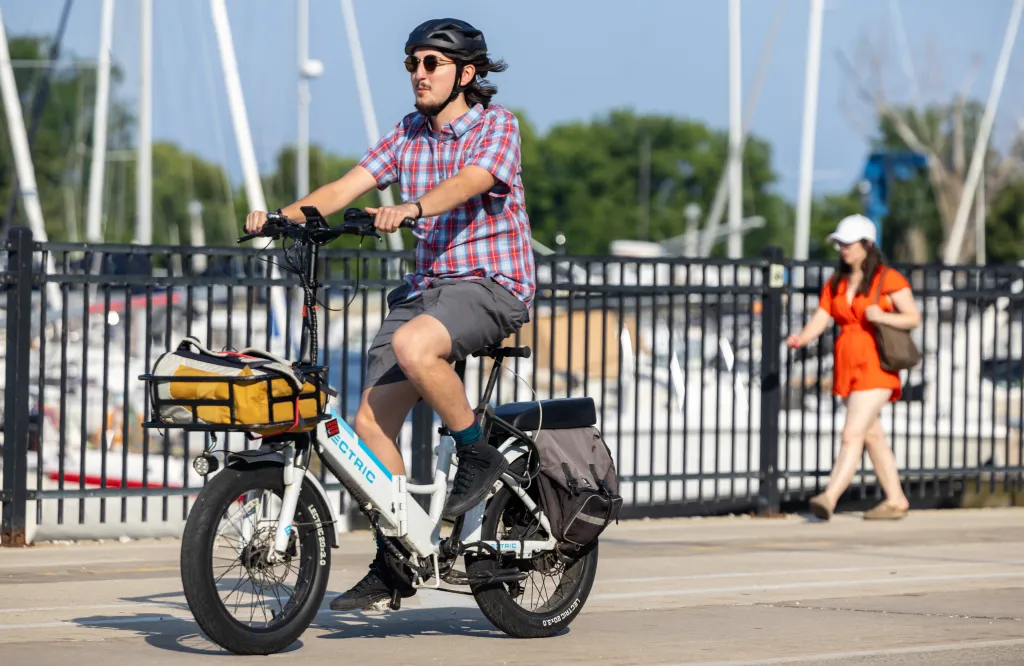
E-bikes are a growing concern statewide, especially in the suburbs where teenage use is rising.
That problem turned into a tragedy last week when a 17-year-old boy from Mount Prospect was killed. Police say he failed to yield at a stop sign and crashed into a pickup truck.
Parents saw their own children in this tragedy. A knee-jerk reaction among some folks was to call for e-bikes and e-scooters to be banned. We understand that temptation, especially in light of this heartbreaking story.
Still, we wouldn’t go that far, but we recognize the growing tension as more e-bikes and scooters hit the streets and sidewalks.
We’ve seen these vehicles used responsibly, too, with drivers wearing protective helmets and navigating streets and sidewalks carefully and efficiently. Some of these drivers are teens getting to school.
But in practice, high-powered e-bikes function more like motorcycles, and yet teens can ride many classes of e-bikes under Illinois law without the licensing or training required for motorcyclists.
Illinois is struggling to keep up with changing technology and habits, but its rules must evolve and adapt.
In Illinois, motorcyclists must go through a licensing process. For 16- and 17-year-olds, the law requires passing a written test and obtaining a 24-month instruction permit. Permit holders may ride only during daylight hours under the direct supervision of a licensed motorcycle operator who is at least 21 years old and has a minimum of one year of driving experience.
In other words, we are not letting teenaged motorcyclists out on our roads without oversight.
So why is it different for electric bikes?
Illinois rules treat e-bikes much like regular bicycles. Riders can use most roads and bike lanes, with few restrictions. Notably, state law prohibits e-bikes on sidewalks, though you can ride an e-scooter on the sidewalk. State rules also say you must be 18 to operate an e-scooter, marking a significant inconsistency between e-bikes and e-scooters. While you must be 16 to operate a class 3 e-bike, there are no age restrictions on class 1 or class 2 e-bikes.
Those are pretty lax rules, given most of these electric bikes cruise at speeds up to 28 mph, depending on the class and model. That’s an additional point of confusion — some devices exceed the legal limits for low-speed e-bikes; advocates refer to these as “e-motos” or out-of-class vehicles. Witnesses reported that the vehicle involved in the Arlington Heights fatality was traveling 30 to 40 mph.
We believe the issue of e-bike and e-scooter safety can’t be ignored, and that dealing with it includes adding some oversight.
Sensible rules for e-bikes and e-scooters begin with clarity and safety: clear categories based on speed and power, limits on where and how fast they can travel and commonsense requirements such as helmets, lights and proper parking.
Some towns are starting to act without updated state guidance. Elk Grove Village in July adopted new rules that require e-bikers to have a valid license to drive on village streets, and they can only ride on roads that have a speed limit less than 35 mph.
“Several municipalities, particularly in the suburbs have adopted their own rules regarding e-bikes,” Secretary of State Alexi Giannoulias told us. “Right now, it’s a hodgepodge or local ordinances and regulations, depending on where you live. That inconsistency is problematic because it makes roads less safe for all of us.”
He told us he’s looking at potential legislative fixes in Springfield next session aimed at updating the state’s vehicle code.
You can quibble with what kind of license should be required, and we’ve seen good arguments against a standard driver’s license as being prohibitive for some folks who wouldn’t otherwise want to drive a car, but do want to use an e-bike to get where they need to go.
Still, given the increasing lawlessness of too many e-bike users, we believe it’s time to set some basic ground rules that prevent more tragedies, injuries and accidents from happening.
Illinois must act now to update its laws — not to ban e-bikes and e-scooters, but to fold them into the transportation system in a way that keeps everyone safe.



